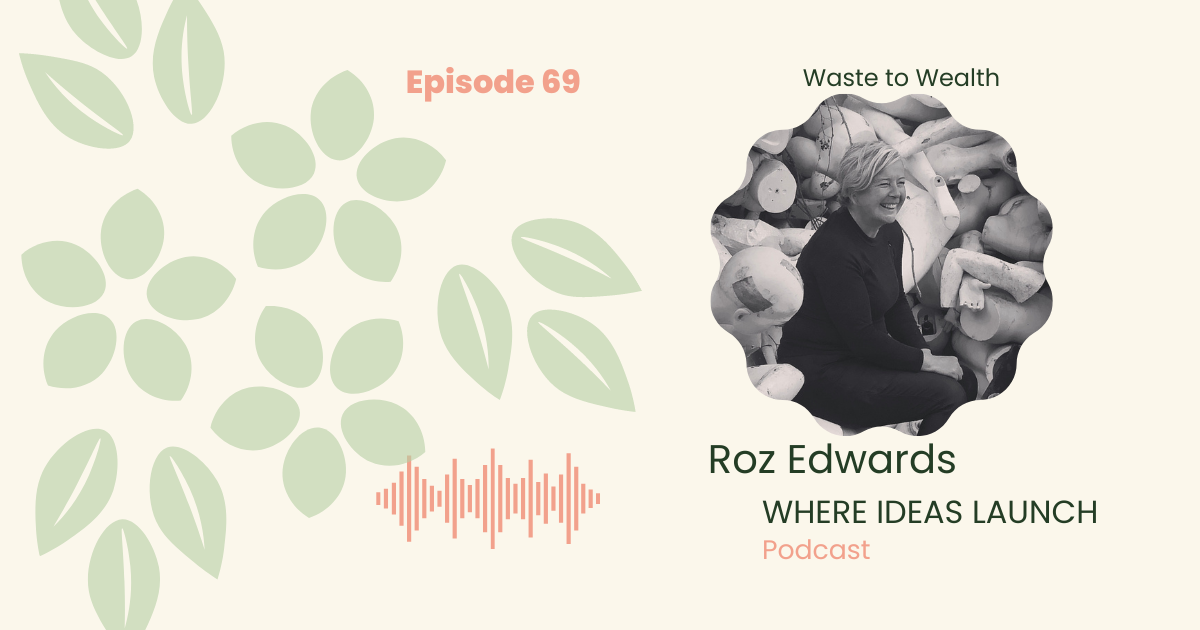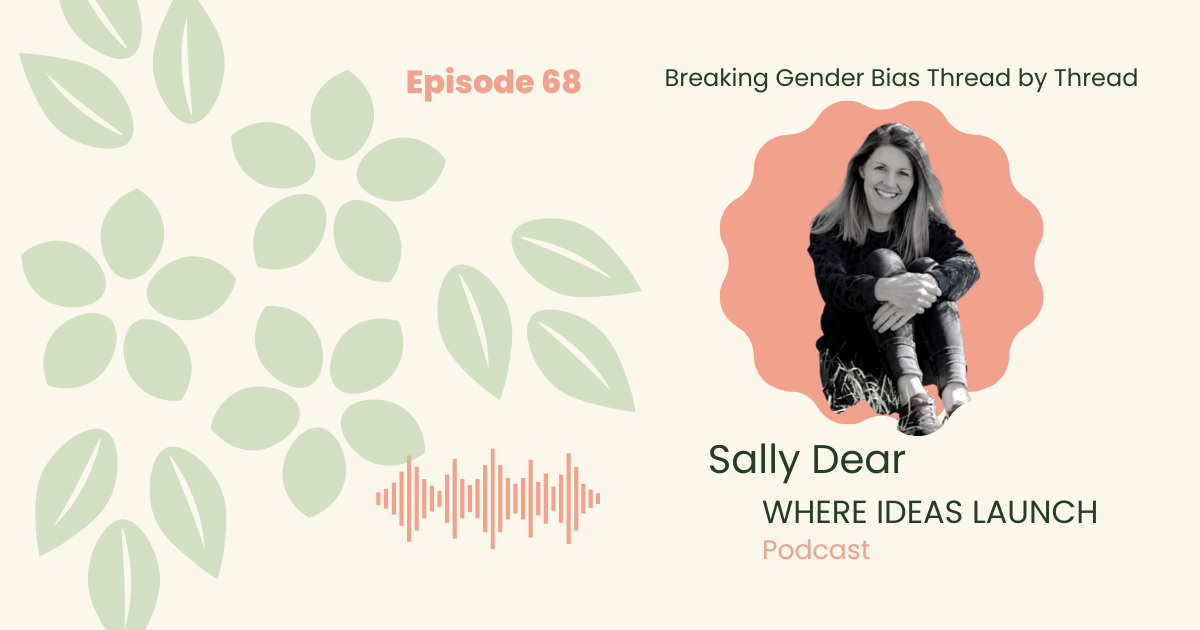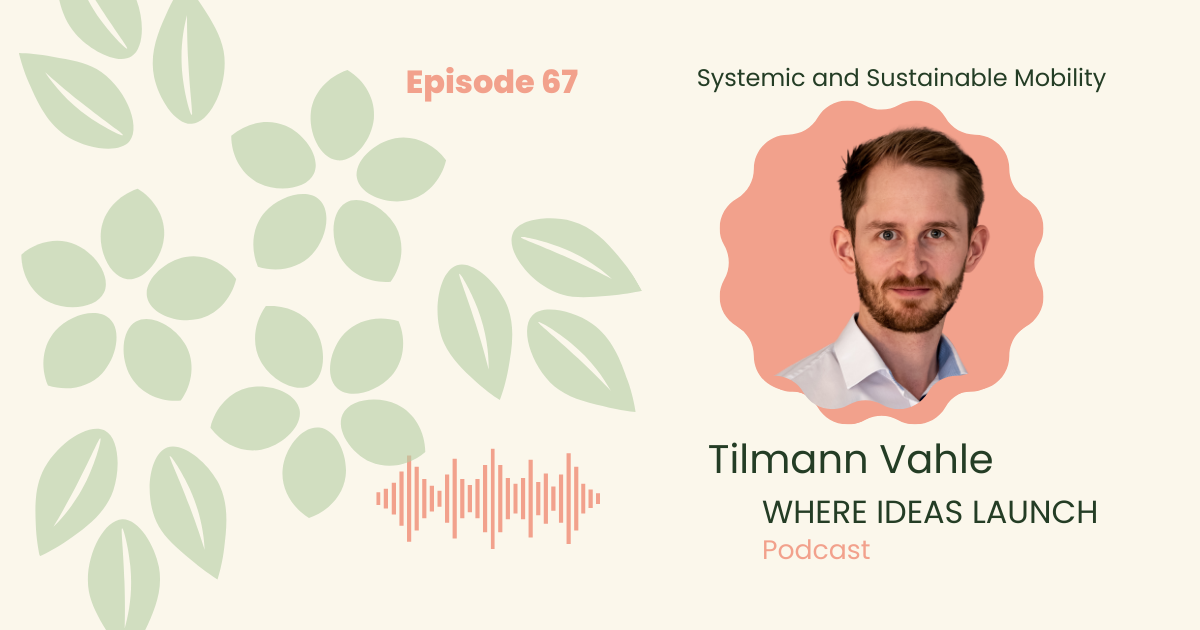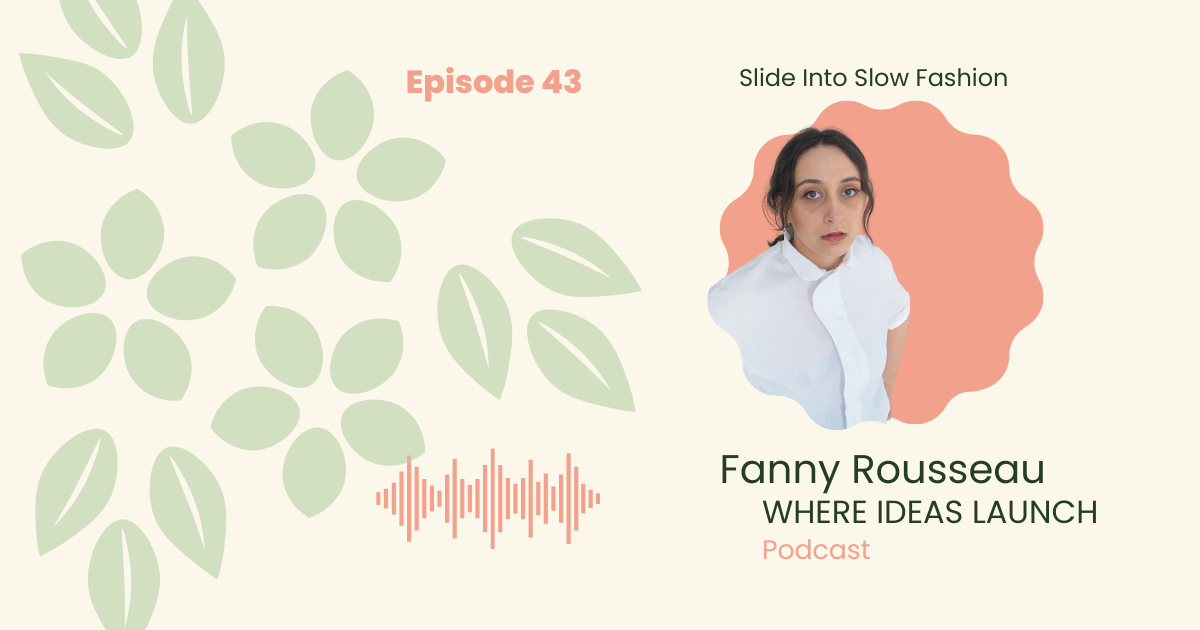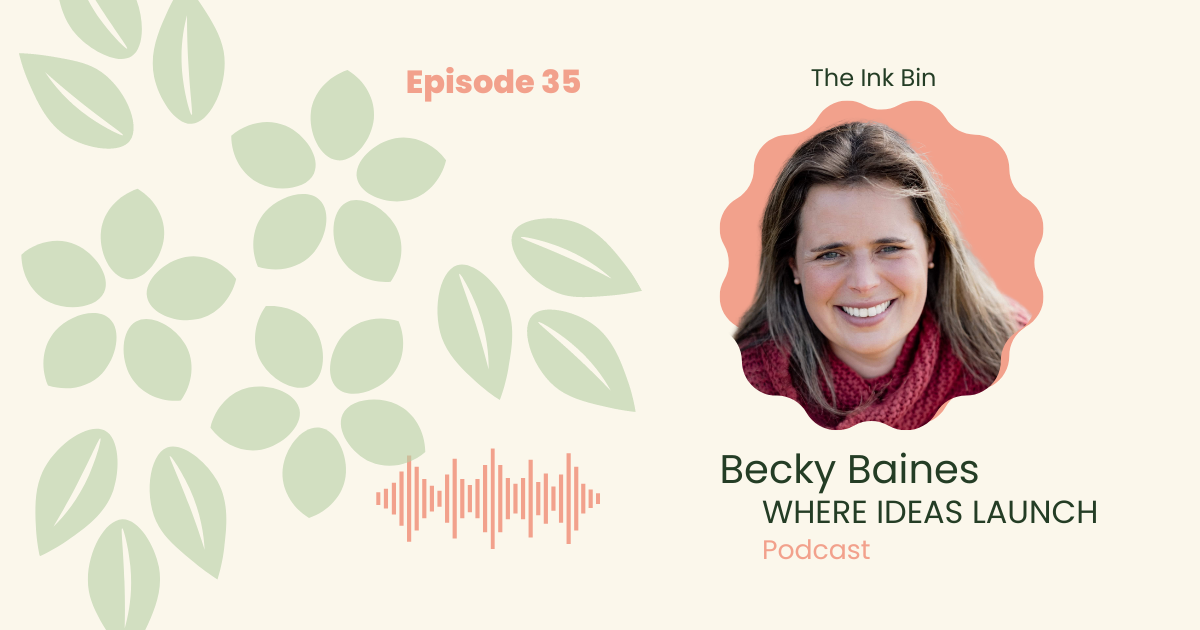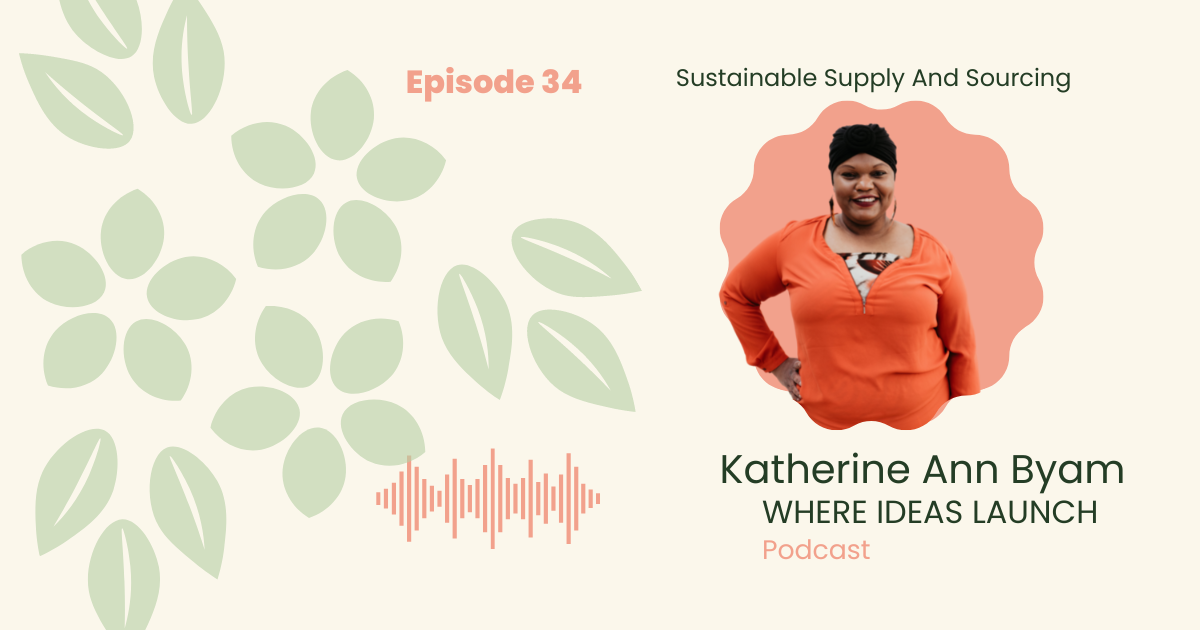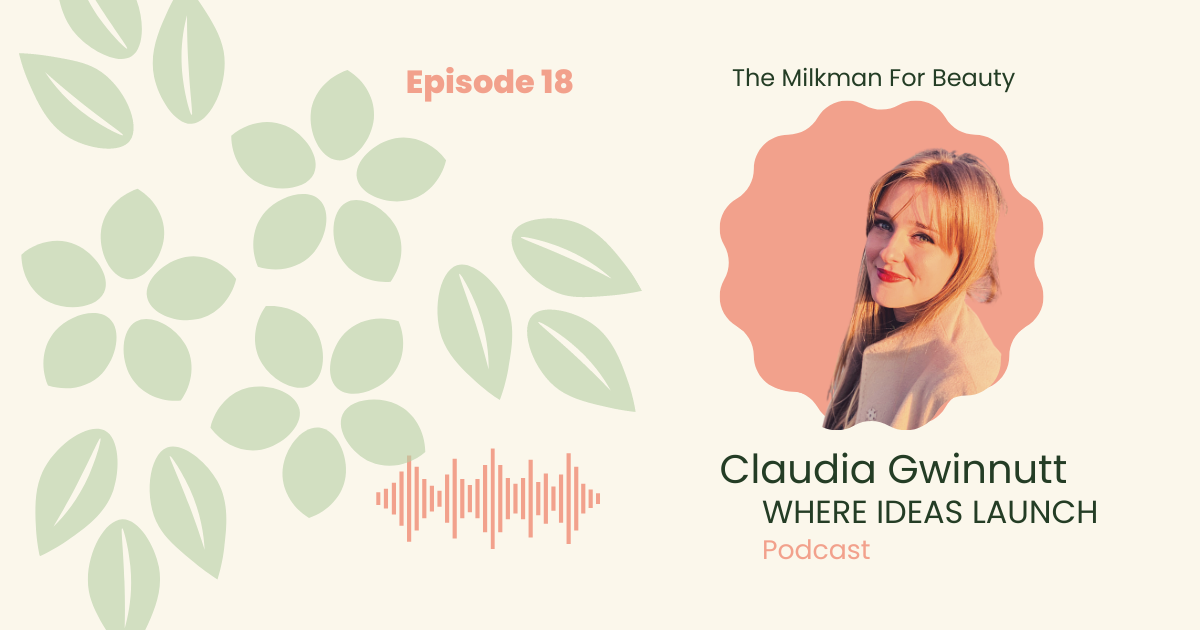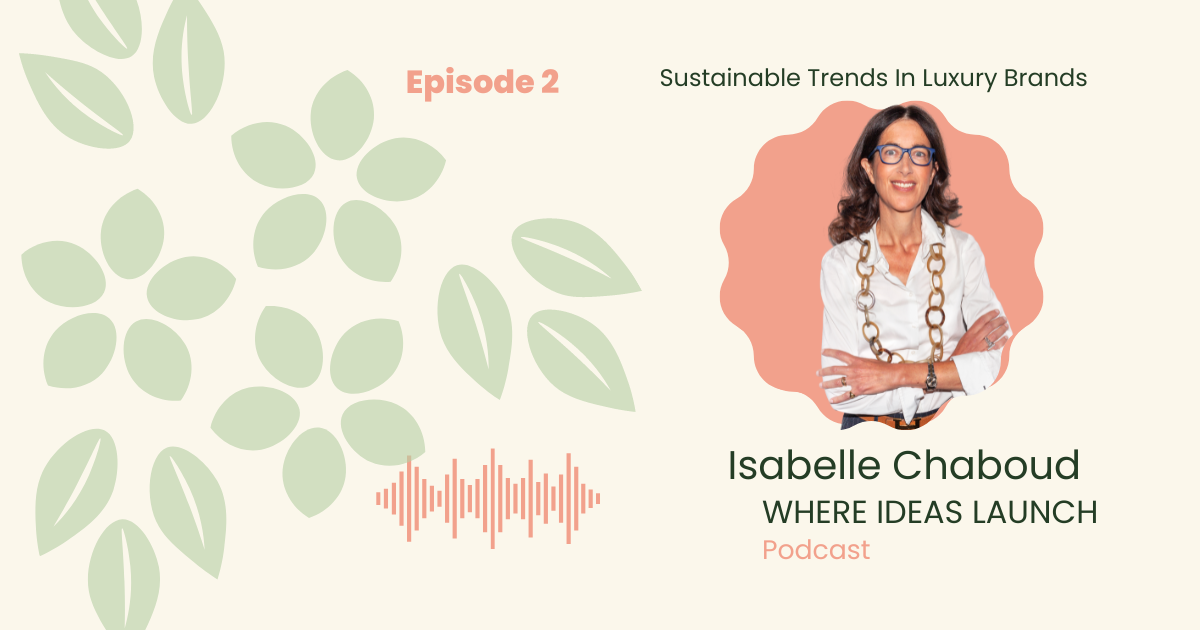073 A Subscription to Heal the Planet
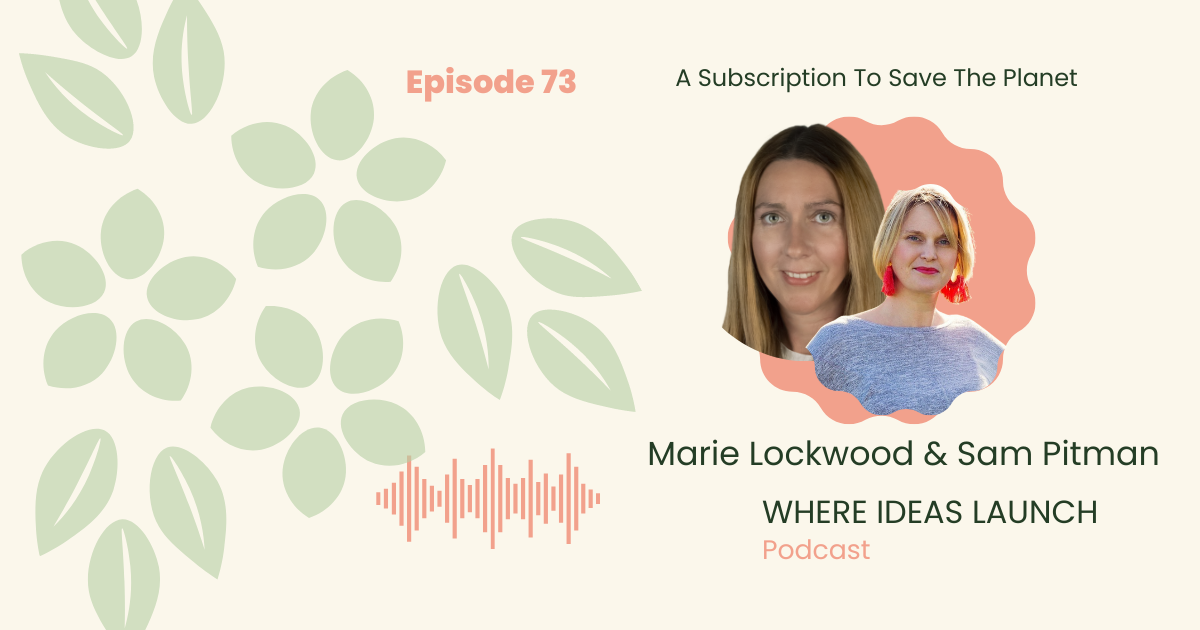
About this Episode
Marie Lockwood is a teacher and the founder of Rebyl Vybes
Rebyl Vybes - Helping you to enjoy life's little pleasures in a sustainable way.
She and her mom prepare and ship home kits for those looking to start on their eco journey and pamper boxes so that you can indulge in some guilt free pleasure on a subscription model basis.
Sam Pitman is an occupational therapist and the Co-founder of Eco Essex, an online community supporting you on your eco journey.
Tune in to learn more about how they are making an impact.
Subscribe to Where Ideas Launch
Connect with Marie and Sam
Episode Transcript
Katherine Ann Byam 0:00
I've just had the most brilliant conversation with a teacher and an occupational therapist two business owners who are helping you modify your views and your approach to plastic. Let's hear a little bit about why this matters.
Marie Lockwood 0:13
My class, there's 26 children and all 26 children now reuse their water bottles that we used to bring in plastic bottles to school. And over the last couple of years, we've sort of tried our best to change their opinions on that through education and allowing them really to find the facts themselves. So 26 Children now bring a reusable bottles in my class, and added that up, that is something like 5122 plastic bottles saved by my one class in a year. Now, times that by all the classes in the school and all the schools in the country it's huge.
Katherine Ann Byam 0:58
This is season five, the great debates of our times, Season Five will be centred around the great debates. And we will be comparing and contrasting different viewpoints on various topics that are consuming the public discourse at present. The reason I've decided to take this approach is because we, or at least many of us, are losing the skill of debate. And I think this is an essential skill for us all to practice once more. I don't see how we get to the point of saving the world and saving our planet. If we don't know how to discuss our differences. I also think that the solution to most of our challenges is somewhere in the spectrum of views but never a type of extreme. I will be working with guests to curate the content and discuss beforehand, I will understand their positions their areas of genius, and navigate my questions around that so that the conversation is challenging and stimulating without being combative. I hope you enjoy season five of where ideas launch the Sustainable Innovation podcast.
Marie Lockwood is a teacher and the founder of rebyl vybes, rebyl vybes helps you to enjoy life's little pleasures in a sustainable way. She and her mum prepare and ship home kits for those looking to start on their eco journey and pamper boxes so that you can indulge in some guilt free pleasure on a subscription model basis. Sam Pitman is an occupational therapist, and the co founder of eco Essex, and online community supporting you on your eco journey. Hi, Marie and hi, Sam, it's great to have you both on where ideas launch.
Read Lockwood 2:33
Thank you for having us, lovely to be here.
Katherine Ann Byam 2:36
Wonderful to have you both. So I'm going to start with the truth. So I feel guilty every week when I take my trash out. And it's full of recycling and landfill waste. Still, even with my greatest efforts to look at things in my kitchen, look at things in my bathroom, I'm still producing a significant amount of waste to landfill. And even just buying a lot of plastics that are single use in some cases, because I can't seem to find another option. Or it's just not a convenient option. Why do you think it's so hard for people who care about the planet to give up their comforts? And what can help us take the next step? That's the usum.
Sam Pitman 3:20
I think there's so many reasons why we don't want to make those changes. And I think some of it is generations and generation of lifestyle. But you can't just change that overnight, you know, our parents generation the way they were brought up, you can't change that overnight. And I think however many years it takes to, for us to have been moulded in this way, it's going to take time to mould us back out of that way. But also, I think there's so many things about our lifestyle that are just easy and convenient. And the lifestyle we have now you know, in Western society, is so consumer based, but you know, we're driven to also think that things make us happy. So if we buy things that'll make us happy, which it does for the short term, right? But it doesn't give us long term joy, but that's what we believe. And so we believe that these things give us comfort and that we need them. And actually, it's really hard to give up that when that's almost what you've been led to believe - I need these things in my life. I think the other thing as well is it can be scary. So even if you want to change your comforts, sometimes it's easy, well it is, it's easier to conform with others isn't it? Always it's easier to conform than it is to actually stand up for what you believe in and be the odd one out. So I think there's so many challenges that we have to face in order to make these changes.
Katherine Ann Byam 4:39
What do you think was the simplest steps for you to take when you made your initial changes I know with a family as well. You know, it changes the game a lot. So there's a lot more things that you need to balance and juggle.
Sam Pitman 4:53
I think being realistic and not aiming for perfection. So for example, when I did cloth nappies, I used cloth nappies with all of my children. But I won't ever say that I used cloth nappies 100% of the time, because it came with it's own challenges. And I didn't want to go out and like have to carry the loads of cloth nappies that are bigger, it's just loads of these reasons; there's more washing, you know, we've twins I have enough washing to do, I did not want more washing. So, you know, rather than us thinking that we have to be black, and we have or we have to be white, it's okay, just to do your best. So I say I use cloth nappies, I don't know, maybe 75% of the time. And that's all I could manage. And it's the same with anything, it's almost like, you know, to be vegan as well, like, amazing if you can be that dedicated to be fully vegan, and I'm not there yet. I'm not at that stage of my own journey. But I'm trying to eat vegan most of the time, there's, I think, as well, if you can be realistic, and not have to aim for perfectionism, that will be really, a really good goal.
Katherine Ann Byam 4:57
So Marie, tell me a bit about rebyl vybes, because I invited you to the show, because I really like the idea of what you're doing. And I want to get into what was behind starting this brand for you, how you came up with the idea, how you decided to do it.
Marie Lockwood 6:13
So I just like to start by saying, I totally agree with Sam starting to make changes any way that you can. And being realistic with them is absolutely one of the most fundamental things you can do because I am not a perfectionist. And I don't, I don't want to come on here and portray myself as somebody that is absolutely plastic free. Because I'm certainly not I'm not there either. And it's convenient at times. And in a busy lifestyle. That's sometimes it's a lot's that takes over. I did start rebyl vybes, because of a frustration that I was becoming more and more aware of during lockdown, there was a huge rise in subscription boxes. And probably like Sam said, because you wanted to make yourself feel good. And you bought something nice, cause you couldn't go out of the house, you know, you did something to make yourself feel better. And to get something nice delivered through the post was was great, if that's what you wanted to do. But I was getting more and more frustrated, because so many subscription boxes I was seeing online, were absolutely filled with single use plastic waste from the packaging of them and the contents of them. And I was actually discussing it with my mum. And we were saying, you know, why are people not looking for something different? So we decided at that point that actually, okay, we had an idea why were we just gonna keep discussing it? Why didn't we do something about it? Because if somebody else can start a business up and get lots of sales for all this plastic waste, why can't we do the same for something that's more sustainable, and really, that is where rebyl vybes started. The name itself, which chose rebel as in rebellion. So rebellion against plastic waste, particularly single use plastic waste, and the logo was really created because we live in a very rare location, we're very close to the sea, we're surrounded by the forests, lots of pine forests here, the Merrylands things like that. So the logo, we wanted something that sort of represented us, where we come from, and therefore that's, that's where our actual logo came from. But we do want to provide an alternative. I think getting a gift box through the post is a great idea. Getting a sustainable gift box is an even better idea.
Katherine Ann Byam 8:37
I absolutely agree. I think that receiving any box anything in the mail that's not a bill, there's a lot of excitement, right? It's actually generates a lot of positive energy and to have something that's actually useful that's not going to make you feel guilty. Is really important I guess what I tend to get like people still like giving gifts you know and giving gifts as a nice idea but when you get the 15th tiny bottle of cream that you're never going to use, you know you're going to just lose it in your handbag again, you know versus you know, getting a little package that's biodegradable that you can plant some seeds, you know, something like this, it just changes completely how you feel about that box. So what's inside your subscription box? What's the potential impact to someone like me who wants to sort of cut waste overall? Tell Tell me about your box.
Marie Lockwood 9:31
Okay, so we have two different boxes. We started off with a pamper box. So inside that is a range of different products. They are bath products, beauty products, body creams, soaps, shampoo bars, something nice maybe like a nice, scented bodywash. But everything inside the box is single use plastic free. It's also bought from other small businesses. So it's sourced from within the UK to try to limit the carbon footprint that we have. And also, most of the bottles, for example, the body wash, for example, is glass bottles. So they're reusable, I reuse mine for lots of different things, I would totally say that anything that can be used is included in it. So the boxes we reuse the boxes for school. So I'm a school teacher as well as business owner. So I have a couple of people at school also that buy our boxes and we use them at school for lots of storage. And things such as that. The other box is a new one it is, it started out to be an equal sort of box where each month will be something different. And this is where Sam comes in. So I met Sam, just through a group on Facebook, and we got chatting, and we decided that Sam would be a really good addition to the box. And she was going to be able to provide people with the sort of educational side of things or tips and useful. Hence, she runs her own group successfully. And we thought that, that would be a really good twist on a different type of box. So in our home boxes are a range of different sustainable products that you might have as an easy swap for essential items. And they are really things that you would use in everyday, like scrubbing brushes, reusable Kitchen rolls, things that you might be able to make a really useful equal swap with, they are going to change. Okay, so we we don't want to be in a situation where we're recreating lots and lots of waste. And I think I've quickly learned that, actually, although the idea behind our box was a really good one to start with, it needs to evolve into something better. So instead of having our original idea, which was going to be a different box per month, so ultimately kitchen box, and then maybe a bathroom focus, we're going to change it to actual home kits. So you have a starter kit, and Sam will still be a part of that box, where this kit will set somebody up for an equal journey. So you're going to be able to get a box delivered, which will have lots of different sustainable options. It'll be ideal for if you're maybe for example, if you're moving house, or you're getting your first house, it could be ideal for a student or somebody that wants to start out when more sustainable journey. So that's the way that we're going. And by doing that it also limits any unnecessary waste, because we don't want to be adding to people's purchases and buying multiples of other things when actually, we're trying to do the opposite.
Katherine Ann Byam 12:57
Yeah. And are we allowed to kind of pick and choose what goes into a box every month? Like is that an option?
Marie Lockwood 13:03
At the minute it's not, but it is something that I am looking into. Because what I would eventually like to do is have a selection whereby you can decide whether or not you need certain items, things such as I mean, I have just recently I've started changing as I go, my plastic scrubbing brush that I've had for a long time is out, but not until it was needing to be put out. And now I've got my more sustainable options. So things like that. So yes, eventually, we would like to give options for people to use and choose what they need.
Katherine Ann Byam 13:39
And Sam, what is your contribution to the box. So I know that there aren't many people probably listening to the show who are used to subscription boxes like this, they're probably used to maybe who gives a crap. So they will order the toilet paper and it will arrive every four months or six months or whatever. Or maybe their used to Gusto or HelloFresh to order some food. But what is your contribution from a service perspective to this box? And how does that work?
Sam Pitman 14:06
Well, I mean, I kind of say to people, I'm in the box. I don't have a product in the box, because I don't sell products, but I sell myself in a way that I want to support people I have learned from my own journey and from supporting others and observing others that are making these changes because they are lifestyle changes. And this is, it's about gaining huge lifestyle information to change the way you think about life and you know, the way we live, there's so much to it that actually it can feel overwhelming and daunting for people and you know, that anxiety of like, I do want to do something but I don't know where to start and I don't really have anybody else to talk to about this because, you know, none of my family care about these issues. And so my aim is to support people through mentoring, whether that's one to one mentoring, if they want that tailored support, I come from an occupational therapy background, you see. So I'm very much used to working with people on a one to one basis in order to help people reach their goals. But at the moment, I offer monthly mentoring sessions, which is an idea that I came up with last year. And I wanted to offer that each month that because it's a more affordable option for people because money is, you know, money is important to people, you know, especially at the moment. So the idea is that I can provide support, tips, as well as giving people a community. And I think I've learned so much over the recent years about how important it is to feel part of, and feel connected to, other like minded people. And I try and keep the vibe positive, because this isn't a happy topic, climate change is not a happy topic. But I very much try and keep it as light hearted as I can, when it comes to making sure people end with an action, you know, let's think of something positive you can do. And maybe let's just, let's maybe reflect on something positive you have done this month, because actually, we can always go, Oh, I didn't do very well at that. And I still use loads of plastic, and I still use my car. But again, that's negative. And that's not helpful. So try and keep it positive. And as down to earth and as straightforward as possible. Like, I'm not into complicated words. And things, I just want to make it useful for people that are starting out on their eco journey, really.
Katherine Ann Byam 16:27
That's perfect. And I want to touch on something that you kind of brought up but didn't fully. So you're both collaborating on this. And what I want to say is that a lot of times when you decide to take this journey, whether it be in your personal life, or in a business decision, like you both have made business decisions around this as well. It can feel quite lonely and the decision fatigue, the need to be in integrity with what you're selling, and promoting and stuff like that can can really be daunting. How important is it to have a collaborator, let me start with Marie,
Marie Lockwood 17:03
Really important, I would say I have learned so much from Sam. So I knew a lot of things beforehand, I was really passionate about what I wanted to do, I had a clear idea about why I wanted to do it. And then Sam came along like a breath of fresh air, and really made me think personally about my own life, and what I was doing in it but also looking for my business. And so Sam's really helped me a lot. She's given me sort of a direction. Almost like she's been my personal mentor on this journey as well. And I've joined her groups and know exactly where she's coming from, I know what she does, and how friendly and approachable she is and I knew exactly that she was definitely the right person to collaborate with, we're on exactly the same wavelength. And I feel like she's somebody that offers a real good balance to our business.
Katherine Ann Byam 18:01
And, Sam for you, what has it been like?
Sam Pitman 18:05
Well again, like Marie said, I think when you find somebody you share values with. And you know, you can bounce ideas off each other and support each other. It's really nice, because, I mean, I sit at home for hours a week, on my own on my computer, and I've got so many ideas. I don't know where to start, you know? And yeah, like you said, decision fatigue is like, and so actually the idea of having somebody to share those decisions with and to have conversations with and bounce ideas with people is really lovely. And not just not to feel alone. Yeah, of course, there's financial benefits if you have a successful business, but I don't even think that's why most people do it is because we just genuinely want to make as big an impact as possible. So, you know, you widen your audience, don't you? You know, you can support more people. So I think it's win win. Really?
Katherine Ann Byam 19:00
Absolutely. So, Marie, I'm gonna go back to you. And in terms of the reception of your boxes, so far, what has been the positive sort of feedback and reinforcements in people's behavioural changes that you've seen,
Marie Lockwood 19:15
We have had some really, really lovely positive feedback. Lots of people have commented to say how excited they are when they receive a box. Now, they really look forward to it coming each month, because they don't know what's going to be in it. But they know whatever it's going to benefit, it's going to be something that's going to help a little bit with either self care, or with the other boxes, it would obviously help with a sort of lifestyle choices. They also I hope anyway, that our boxes, inspire people and educate them in some way, shape or form, whether or not it's through Sam involvement in her maintenance sessions or whether or not it just makes them think, you know, I didn't try that before. Maybe, maybe I should try this one now. Because everybody's learning, I'm learning on the journey as much as everybody else is I'm still finding different choices that I can use, I'm still trying out different products, and I'm finding which ones work best for me. So I think it's I'm hoping anyway that our boxes are educating, inspiring and giving a little glimmer of something nice in amongst our busy lives really.
Katherine Ann Byam 20:26
You know, it starts with a spark, right? That's, that's what everyone really says. And when you light that fire, it ripples and ripples after a while, it's similar to me starting this journey where ideas launch as a podcast, when I started it, my aim was to sort of influence my friends, if I'm being honest, like I come from a big corporate background, and you know, all of my friends work in companies who actually have the power to make change, but probably aren't necessarily as passionate about the change. And I wanted to sort of nudge them, right that was my idea behind the podcast to kind of nudge them, let them see that there's, there's possibility not just from a technical standpoint, in terms of, you know, what the great thinkers are doing, and from a business perspective, as well, but also small entrepreneurs, small businesses, people who are just fed up and deciding to do something about it like yourselves, and I think that I didn't know it immediately, because, you know, the initial feedback was great, but then it was like, oh, maybe people aren't listening as much. It's not as big as other podcasts. But today is like, even though it's still a very niche podcast, you know, I have such good feedback, like, the quality of the feedback is just improved and improved. People are really excited to hear these stories, and you know, they really engage in what I'm doing. And it doesn't matter what level they are right from, from the CEOs, to someone who is, you know, just picking up a business for the first time, everyone's excited about what the story and the message is. So I think, definitely, you have to keep going. You have to keep going. And you have to find more ways to collaborate and interact with as many business owners and people as possible. So I'm going to switch to another question now. And there are many who like to challenge the idea of the Sustainable straw and the sustainable toothbrush. So let's explore this a little bit. So I've seen the documentaries of you know, the straws, and in a turtles, turtles throat and you know, getting stuck, etc. Yet, we know that straws aren't the biggest problem in the ocean, right? Like, the actual biggest problem in the ocean is probably the fishing nets. If we really think about it like that, even though the way that we fish the way that commercial fishing is done. Or if we look at things like the toothbrush, typically, we still got plastic in the bristles, right? There's still nothing that we can yet do about that. So what are your thoughts about putting these products together and transitioning to sustainable products? Even knowing that, you know, it's not, it's not fully there, what are your thoughts on that?
Sam Pitman 23:09
I have two views it's like do the stuff that's really easy, that's not going to stress you out and overwhelm you. But also, as you don't stress about all the little things just do something really useful.
Katherine Ann Byam 23:19
Yeah, you know, I see it in two ways as well, I see that making these small changes is symbolic as well. So this is one of the things one of the reasons I'm excited about Marie's box it's like, this is a symbolic, I am making a shift. And every time I go to the bathroom, and I see this wooden toothbrush, or I see my soap dish that's now you know, there when it's little loofa to absorb some of the soap droppings, so that I can reuse that soap that drops off the soap bar, you know, every time you see these things, it's a reminder of what I've committed to, and having them as things that you deal with every day reminds you of that commitment every day. So it's not just about the item itself. It's about what the item represents. I don't know if you share that, Marie?
Marie Lockwood 24:06
Yeah, absolutely. And in my sort of opinion, I think that all change efforts are positive change it's better than no change at all. As I said before, I'm also a teacher. So through education wise, we are really keen to try to turn that sort of tide on the use of plastic with children that we have in our own classes. So anything that we can actually have an impact with so for example, my class there's 26 children in it and I added up the other day that all 26 children now reuse their water bottles that they used to bring in plastic bottles to school. And over the last couple of years we've sort of tried our best to change the opinions on that through education and allowing them really to find the facts themselves. So 26 children now bring a reusable bottle to my class. And when I added that up, that is something like 5122 plastic bottles saved by my one class in a year. Now times that by all the classes in the school and all the schools in the country is huge, absolutely massive. So, in my opinion, one small change, as long as it's a change for the good is better than nothing. And I think I always like to go back, there's a quote that says I am only one said 7 billion people, I love that. And I think that is absolutely spot on hits the nail on the head.
Sam Pitman 25:42
I think what I like about that Marie is that you've not just inspired like one person, though, you've inspired all that whole class, and I'm guessing your whole school, and all of those families. And that's almost where it's bigger, isn't it, because you can start with one thing. That's what I was saying earlier. Like, if I just do that, but never talk about it, I'm not going to have a huge impact. But when one person does it times, you're whole school. And then that those children have inspired all of their parents and all those families, it ends up having this bigger effect.
Marie Lockwood 26:11
Yeah, and children are sometimes the best people to pressure parents, because they nag at you, and they tell you why you should change it. And they're very honest. And they show you the facts and the figures, and they make you feel a bit guilty. So you tend to want to change. So at the minute, as well as my own class, which they are really on board with everything. I've also got another school, further down the country who's also starting out on a plastic free schools journey. So we're going to do a little bit of collaboration, hopefully, so it will spread. And that's the bigger picture that will join the plastic free schools programme. And we'll try and get our message out across as many people as possible.
Sam Pitman 26:59
But I almost think, for most people, that's almost the obvious starting point, isn't it, of like to get them on board is actually making those simple steps because they are easy, and like the subscription kit, you're gonna have like, it's just easy, there's almost another reason to do it. Because you're taking all the pressure off. And it's easy to do that.
Katherine Ann Byam 27:17
That's awesome. I want to switch now to sort of regulation. So I'm going to tell a story before I comment on this regulatory change. So I've been in London last couple of weeks, cat sitting for a friend of mine, and in an area where you know, the families are well off. So at the schools in the neighbourhood, all the cars that were pulling up were Tesla's. Now, one of the reasons I think that is, is that, you know, London has recently introduced this ultra low emission zone, so you have this additional charge, you still have the congestion tax. So there's loads of charges now for having a car for driving around in a car. And that has prompted a wide scale change and switch to electric cars. So this is why a lot of the mums in this neighbourhood are now driving these electric cars. Now, there's a lot of debates. And you know, I have a friend who's been on this podcast, who really talks about the sustainable mobility transition. And we can argue that, you know, maybe they don't need a car, they can just walk with their kids, perhaps that would have been a better switch. But knowing that people have these hard encoded habits, then perhaps electric vehicles are a nice interim shift, and regulation that supports that preserves the economy, and also promotes, the better behaviours for the planet. Now, we know that the UN has recently reviewed its Environment Programme, and recently passed a resolution to deal with plastics throughout its lifecycle, so forcing companies to sort of deal with their plastic throughout the life of the product. How do you see this impacting how business is done today?
Marie Lockwood 29:07
I think that it's a really good thing that's happened, actually, I think that it's gonna make a lot more businesses accountable, and a lot more transparent. Because at the end of the day, we'll reach a point in this time, where it's actually at crisis level, it's, gone beyond what is ever going to be acceptable. And if something doesn't happen now, then there's gonna be a disaster, that's looming ahead of us, really. I mean, I was looking at facts and figures just a few days ago. And even though I knew how bad the plastic production is for our planet, when you actually look into the facts and figures of it, it's absolutely astounding. And the more worrying thing is the forecast and their predictions for what it might become. So for example, I think it was 400 million tonnes of plastic produced at the minute but its potential as to double by 2040 if nothing was to happen, and given that at the minute, we have a huge problem with plastic pollution entering the seas, I think something desperately needed doing. So I think as much as for some businesses, it might be a struggle to make that shift. I think really, in realistic terms, it's the only way forward, because we're heading for disaster otherwise.
Katherine Ann Byam 30:29
And Sam, your views,
Sam Pitman 30:30
One of the things I'm realising is that small businesses especially don't necessarily see how sustainability is relevant to them. If they're not in and they're not selling the toothbrushes or electric cars, it's almost like they can't relate to it. It's not relevant to their business. So I, you know, the more we can do to enforce businesses to do things or follow these policies, I mean, we have to, like Marie said, we, it's kind of we can't be gentle anymore. You know, yes, it is going to have impacts for business. But I almost see as no choice now we have to, these changes have to happen and businesses have to take responsibility for products, you know, the fact that not only 9% of plastic that can be recycled is actually recycled. And that's a crazy figure like that. That's not on, like in theory, like no plastic ever needs to be virgin produce, again, we have enough plastic to make everything. So yeah, I agree that businesses have to start doing more now.
Katherine Ann Byam 31:24
Okay, so I'm gonna move to rapid fire questions to sort of close this out. I'm gonna, alternate between between both of you. And I did not prepare you for this. So I'm gonna with Marie. So my rapid fire question to you is, what's the most transformational sustainability book you've read?
Marie Lockwood 31:48
Oh, my goodness, you really put me on the spot now because my memory is shocking. To be honest, you know, I don't read books are such I read online documents, and probably one of the ones that really hits home to me as one from the United Nations. It's called pollution to solution. And that is full of really good information, facts and figures that support everything that's really behind my business, everything that I strive to try to do, and it really hits home. Why every business needs to change, not just me as a small business, but huge businesses, everybody. You know, it's our responsibility it's everybody's responsibility, because we've all created, we're all we've all created waste. We all do continue to create waste.
Katherine Ann Byam 32:42
And Sam moving to you. What's your favourite documentary? And why?
Sam Pitman 32:46
Oh documentary? Ah, the one that sticks in my mind the most? I've probably watched in the last month is SeaSpiracy. I mean, it was a bit controversial when there was criticisms after it came out, but you know, there's gonna be there's always somebody's gonna say something negative about these shocking facts, I've never actually eaten fish, because I have some kind of random phobia, thing. But if I did, I would never have been able to eat fish again, after watching that. And I like, Katherine, you said something only about actually, the biggest pollution in the sea is actually not the plastic straws. It's the fishing nets. And actually, the devastation from fishing nets I never knew. And that was a real, real eye opener.
Marie Lockwood 33:29
I actually cried after watching that it was horrible, in a really shocking way, but one that I needed to listen to.
Sam Pitman 33:36
Yeah, exactly.
Katherine Ann Byam 33:38
Marie, what's your greatest lesson? In this whole journey?
Marie Lockwood 33:43
My greatest lesson is probably to not strive for perfection. But to know that actually doing something is better than doing nothing and knowing that what I am doing is as good as I can do at this moment in time. And that is, okay. It's, you don't need to be perfect. You know, we all have our flaws. But we're all trying to learn as we go, and we do what we can.
Katherine Ann Byam 34:11
And Sam what's your biggest dream?
Sam Pitman 34:14
My biggest dream? Oh, wow. Well, obviously, just to reverse climate change completely. Obviously, my dream would be if we could keep under this 1.5 degree. You know, heat rise would be amazing. But if I looked at more personal journeys, my role would be about actually feeling like I actually am making a big impact in within Essex and beyond, which is a subjective goal, which I don't know if I can ever achieve. They can't measure it. But yeah, my dream is to have real real impact in Essex to make differences to individuals and businesses to be more sustainable.
Katherine Ann Byam 34:54
Wonderful, ladies, tell my listeners how they can connect with you. Let's start with Marie.
Marie Lockwood 34:59
So you can find me on Instagram under rebyl vybes or via Facebook. Or you can alternatively you can go on and have a look at my website, www dot rebyl vybes.co.uk
Katherine Ann Byam 35:13
And that's vy BS vibes.
Marie Lockwood 35:16
It is it's slightly different, so it's R E B Y L V Y B E S, we had to be very careful when we were looking into trademarks.
Sam Pitman 35:25
And you just wanted to be a rebel and spell rebel, wrong?
Marie Lockwood 35:27
We just wanted exactly that.
Sam Pitman 35:32
Yep, so, yep, Facebook, Instagram. Eco Essex.
Katherine Ann Byam 35:38
Wonderful. Thank you, ladies so much for coming on the show. I know it's late at night. We had to get the kids to bed before before we did this. Thanks so much for spending the time with me. Thanks so much for having us. Yeah, thank you.
This podcast is brought to you today by the brand new women in sustainable business awards that kicks off in 2023. If you're a business owner who's starting a business with principles of sustainability in mind, and you want to preserve some lost skills, some handcrafting, artisanal work, or you're a social media manager supporting purpose driven brands, or you're creating fashion or something that is relevant to the sustainability and green transformation. You are more than welcome to join us and to get involved in these awards. Check out our group on Facebook women in sustainable business, or follow the podcast where ideas launch on Instagram to find out more
